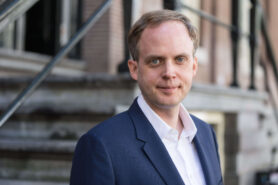CDH lecture by Prof. Tobias Blanke: Deep Culture - New Mediations of Culture and Artificial Intelligence
| Action | Key |
|---|---|
| Play / Pause | K or space |
| Mute / Unmute | M |
| Toggle fullscreen mode | F |
| Select next subtitles | C |
| Select next audio track | A |
| Toggle automatic slides maximization | V |
| Seek 5s backward | left arrow |
| Seek 5s forward | right arrow |
| Seek 10s backward | shift + left arrow or J |
| Seek 10s forward | shift + right arrow or L |
| Seek 60s backward | control + left arrow |
| Seek 60s forward | control + right arrow |
| Seek 1 frame backward | alt + left arrow |
| Seek 1 frame forward | alt + right arrow |
| Decrease volume | shift + down arrow |
| Increase volume | shift + up arrow |
| Decrease playback rate | < |
| Increase playback rate | > |
| Seek to end | end |
| Seek to beginning | beginning |
When subscribed to notifications, an email will be sent to you for all added annotations.
Your user account has no email address.
Information on this media
Prof. Tobias Blanke, University Professor of Artificial Intelligence and Humanities at the University of Amsterdam, discussed his new project: 'Deep Culture – New Mediations of Culture and Artificial Intelligence' in this online lecture on 28 November 2024. This lecture was organized by the Centre for Digital Humanities (Utrecht University).
Deep learning technologies have taken the worlds of commercial and academic AI by storm. ChatGPT has generated a lot of excitement about our new relations with AI but has also revealed much public anxiety around deep learning. There is too little understanding of the fundamental shift in cultural relations deep learning has brought about.
Blanke’s project coins the term ‘deep culture’ to describe the global transformations that deep learning has wrought on culture and how culture is in turn key to deep learning. Neither overly enthusiastic nor despairing about the new deep culture, the project proposes reshaping our relationships with it to address the complexities of cultures and values of difference.
The project will first explore epistemic translations between deep learning and historical-cultural concepts and practices. Secondly, it will work with deep-learning methods to address their limitations for critical analysis. Finally, it aims to produce diverse public understandings of deep learning’s global relations to culture.
This project is funded by the prestigious Advanced Grants program of the European Research Council (ERC). The grants, which amount to 2.5 million euros per project, are awarded on the basis of the proven scientific excellence of the academics and their research proposals.
About

Tobias Blanke is University Professor of Artificial Intelligence and Humanities at the University of Amsterdam and the Institute for Logic, Language, and Computation. He is also affiliated with King’s College London as Professor of Social and Cultural Informatics. His academic background is in computer science and political philosophy.
Tobias' principal research interests lie in artificial intelligence and big data devices for research, particularly in the human sciences. He has also published extensively on ethical questions of Artificial Intelligence such as predictive policing and algorithmic otherings, as well as critical digital practices, and the critique of digital platforms. You can find more information about prof. Tobias Blanke and his most recent projects and publications on his website.
Chairman of this lecture was dr. Niels van Miltenburg, assistant professor of theoretical philosophy and coordinator of the bachelor of artificial intelligence at Utrecht University.